Don't wanna be here? Send us removal request.
Text
Read Uncle Vanya recently, and was struck by the similarity between Sonya's famous monologue at the end of the play and the church scene in "Beneath You." Specifically Spike's repetition of the phrase "Can we rest?"
SPIKE: [He walks to the crucifix at the altar.] She shall look on him with forgiveness, and everybody will forgive and love. He will be loved. [He stands before the crucifix, staring at it.] So everything's okay, right? [He embraces the crucifix, and his body begins to smoke.] Can we rest now? Buffy? Can we rest? - Buffy the Vampire Slayer 7x02 "Beneath You"
Here's Sonya's full monologue, though the most relevant part is at the end:
SONYA: What's to be done, we must go on living! [Pause] We shall go on living, Uncle Vanya. We shall live through a long, long chain of days and endless evenings; we shall patiently bear the trials fate sends us; we'll work for others, now and in our old age, without ever knowing rest, and when our time comes, we shall die submissively; and there, beyond the grave, we shall say that we have suffered, that we have wept, and have known bitterness, and God will have pity on us; and you and I, Uncle, dear Uncle, shall behold a life that is bright, beautiful, and fine. We shall rejoice and look back on our present troubles with tenderness, with a smile--and we shall rest. I have faith, Uncle, I have fervent, passionate faith... [Kneeling before him, lays her head on his hand; in a weary voice] We shall rest! [TELYEGIN softly plays the guitar.] We shall rest! We shall hear the angels, and see the heavens all sparkling like jewels; we shall see all earthly evil, all our sufferings, drowned in a mercy that will fill the whole world, and our life will grow peaceful, gentle, sweet as a caress. I have faith, I have faith... [Wipes away his tears with a handkerchief.] Poor, poor Uncle Vanya, you're crying... [Through tears] You have had no joy in your life, but wait, Uncle Vanya, wait... We shall rest... [Puts her arms around him.] We shall rest! [The WATCHMAN taps; TELYEGIN plays softly; MARIA VASILYEVNA makes notes on the margin of her pamphlet; MARINA knits her stocking.] We shall rest! The Curtain Falls Slowly - Uncle Vanya, Anton Chekhov (trans. Ann Dunnigan)
Uncle Vanya is a story of ennui and disappointment with life. The titular Vanya and his niece Sonya have spent their lives dedicated to supporting Sonya's father Serebryakov, a celebrated academic, at the expense of their own yearnings and ambitions in life. Over the course of the play, both experience disappointment in romantic love. They are also shocked by Serebryakov's intention to sell the estate they have poured their lives and funds into, without regard for the precarious position it will leave them in. Near the climax of the play, Vanya attempts and impotently fails to kill both Serebryakov and himself. Sonya and Vanya end the play where they began, toiling and romantically alone. On the surface, Sonya's monologue is a spiritually optimistic exhortation to endure and hope in the face of unrewarding drudgery. But it also highlights the bleak inability of the characters to change their circumstances on their own.
"When done well it’s not just Vanya who weeps. Through an act of will, the thing that has most afflicted them – drudgery – can be embraced. The (religious) reward is loaded with paradox: in death they will find rest, and new life. Whether or not you believe in God, it’s bleak yet the repeated phrases (“We shall rest!”, “I have faith”) have a persuasive force of uplift, tolling like a bell." - Dominic Cavendish, The Telegraph
The connections to Buffy are numerous. Like Buffy, Uncle Vanya depicts the existential dilemma: How to carry on in the face of cosmic indifference? If your lot is drudgery, how do you keep going? Throughout the show, Buffy experiences slaying as an often dreary, inescapable fate, one which she has to imbue with her own meaning instead of expecting recognition or the approval of authorities or institutions. In seasons five and six this metaphorical slog is made more human and literal as Buffy struggles to continue on with the everyday aspects of being an adult. Buffy gets her rest at the end of season five, but heaven only ends up being a false, temporary respite--she has to keep going.
Freshly ensouled, Spike in "Beneath You" is newly aware of the existential struggle. Like Vanya and Sonya, Spike has been romantically disappointed and disillusioned, and can no longer rely on it as a source of meaning. It parallels Buffy's own disillusionments when it comes to both romance and Romance (for more on this if curious, there's my unfinished romanticism series). Furthermore, now that he can make true moral choices, Spike is faced with the prospect of having to keep on making them--day after day after day--and living with the consequences. He now truly understands that, due to his actions, a chance with Buffy is impossible--that his labors, with Buffy in mind, like Vanya and Sonya with Serebryakov, cannot reward him--that his romantic and heroic narratives of himself are pathetic, broken. Now he'll have to find some other reason to keep on making choices, and it will be a thankless, unending task.
But the scene also inverts aspects of Sonya's monologue in interesting ways, making it both more and less optimistic. As a text, Buffy is not underwritten by any kind of religious or spiritual faith. Where Sonya puts God ("God will have pity on us"), Spike puts Buffy ("She shall look on him with forgiveness"), and this invocation of deity is more clearly ironic in Spike's case. He proceeds to drape himself on a cross, a Christian symbol, and the fact that it burns him emphasizes the inability of formal religion to provide the absolution or direction or reprieve he might crave. In general, the religious imagery in the church scene, the basic image of an empty church, supports the idea that this is a scene about the struggle for meaning. What does it mean to crave redemption if there's no God (or Buffy) to grant it to you?
What is left, instead, is the human ability to provide such things. On the one hand, in Buffy, one cannot have faith in even a bleak hope of spiritual reprieve. But on the other hand, there is a hope and belief in people's capacity for agency and change. As always, any given scene should ultimately be tied back to Buffy's story, especially when the scene is a dramatic centerpiece between Buffy and Spike--who, like the other major characters, has paralleled her throughout the show. I think it's very significant that this scene comes so early in the season. It restates, via Spike, Buffy's own struggle for meaning and agency within the Slayer fate, adult existence, and Romantic ideas that bound her. It re-establishes that this is one of the show's most central ideas, something to be re-explored throughout the season and resolved--in some way--by the end. (Which I think it is. There are a lot of connections between this scene and Buffy and Spike's final scene in "Chosen." Spike's sacrifice, done without stated belief in Buffy's love, suggests achievement of some internal locus of meaning. He burns with purpose, instead of on a cross. This parallels Buffy's triumph over the first and sharing the Slayer power. She no longer burns on the cross of self-hatred, or slogging away at an isolated fate.)
Of course, as ever, I don't know for sure whether or not Vanya was a direct influence or reference. I would say it's fairly likely. I wasn't able to find anything direct on the subject. All I was able to turn up was that Joss Whedon (who wrote and directed that scene) had not seen The Seagull--another Chekhov play--until ca 2007, which doesn't exactly help my thesis, lol. But I will say Vanya is probably the more famous play, and Whedon has a documented love of theater, given "Once More, With Feeling" and the Shakespeare readings hosted at his house and such. Also, Vanya on 42nd Street, a classic performance of the play, was released in 1994. The modern, stripped-down rendition of Vanya in that movie has aspects in common with Whedon's version of Much Ado About Nothing. Here's Sonya's monologue from that Vanya. The delivery of "We shall rest" is simple and restrained, closer to Spike's delivery of "Can we rest" than a more ecstatic Sonya performance.
youtube
The church scene, also for reference:
youtube
#i looked around to see if anyone had made this connection before#and i couldn't find anything#but correct me if i'm wrong about that would love to read any other writing on the subject#s7#buffy#spike#uncle vanya#anton chekhov#btvs#boy it's been so long i had to look up what tags i use
55 notes
·
View notes
Note
op just so u know, i think you're fantastic and basically just the best analysis blog i've read for anything ever. i've been reading your stuff for years on and off and so much of it has really stuck with me, i feel like i've learned so much from reading your posts. i hope you're doing well right now, you deserve only good things, and even if you don't return to us i'm so grateful we have your blog as a resource. genuinely 2 me u r the analysis goat. take care of yourself xx
This is such a kind message, and made me feel incredibly warm inside. Thank you so much for taking the time to send it!
8 notes
·
View notes
Text
**succession spoilers**
interesting to compare the handling of the physicality of death in the most recent succession ep with the handling in buffy’s ‘the body’. ‘the body’ is extremely physical. joyce’s corpse opens and closes each act. buffy is the one who has to perform cpr, and sit with her mother’s body in a bag in her living room. she vomits. she cracks a rib. xander punching a wall, the kiss between willow and tara, the hugs the characters exchange in the hospital--the physicality is constant and arresting. (which makes the closing shot of dawn’s hand never quite touching joyce all the more harrowing).
by contrast, we only barely see logan’s body in ‘connor’s wedding’. the siblings are miles away from him. his body is literally in the air, ungrounded. some stranger is performing cpr, not them. and all they can do is listen and demand ineffectually, through the proxy of tom’s usual gormless editorializing. even at the moment of their father’s death--a moment that the grand physicality of mortal existence might touch them--they are insulated from it. even now, they don’t know the price of milk. even death is a penthouse in the sky above the city rabble. even during this most serious of events they can’t quite be what logan might think of as ‘serious people.’ (and even now, of course, it’s hard not to see that distance as mostly logan’s own doing. even now, when death has caught up to him, logan isn’t any more touchable. but in a far different way than dawn with joyce. ‘that’s dad’, says roman, pointing at a chart on a screen.).
nothing is physical except--and here seems to be the glimmering thread of hope throughout the series--in the relationships between the siblings. the various hugs between them, especially the last one between kendall, roman, and shiv. kendall and shiv holding hands. kendall touching roman’s back, roman touching shiv’s. this is one of the only places the physical exists in their lives, and in this episode they express it towards each other more easily, with less irony or pretense, than i think they’ve done at any point so far in the show.
i don’t know what the show will do with that glimmer. whether it will remain tragically nothing more than that, or bittersweetly become more, while still not being enough. or any number of other things. i think the season might be taking the idea of ‘the real’ to a head, after its many depictions of frustrated attempts to access it. (or perhaps i just think that because the concept of ‘the real’ was equally relevant to seasons five and six of buffy, and ‘the body’ was crucial to that subject.) but in terms of how to use mortality in an artistic way, it’s interesting to see two different approaches that are both effective. you can evoke the physical, and ideas associated with it, equally well by leaning into it or leaning away from it.
161 notes
·
View notes
Note
hello! i wanted to go through the links on this post: https://at.tumblr.com/impalementation/theres-some-really-incredible-stuff-in-the/hke6ndhhy7wi but they all seem to be broken?
Hiya. Looks like buffyforums changed some of its urls. From searching the forum, it appears you can now find the season six rewatch thread here: https://www.buffyforums.net/forum/buffyverse/buffy/season-6/16984-btvs-rewatch-season-6 That first post has links to the discussions for all of the episodes. Enjoy.
13 notes
·
View notes
Note
I dont think I'll be able to articulate this well, but I wanted to ask your opinion on why fans' reaction/response to Faith in 'Who Are You?' is much more sympathetic than to Buffy in 'Dead Things' and s6 in general (in my experience at least) even though they're obviously very similar (this may just be my own experience in fandom though, so feel free to ignore)
Hm, honestly I'm not really all that familiar enough with fan opinion to know whether people are more consistently on Buffy or Faith's side in those two instances. If the difference does exist, I imagine it might have to do with the difference in expectations for Buffy and Faith's characters. Because Buffy is the hero, it's much more emotionally and psychologically dissonant for audience members to see her behaving in a ‘non-heroic’ way (just as it is for Buffy herself!). Whereas because Faith is not interpreted as a moral example, but instead as someone struggling with morality, she isn’t held to the same standard. Her moral lapses are easier to respond to sympathetically because they’re not being experienced as a betrayal.
Which really, seems intentional to me. I think the show wants the audience to feel uncomfortable at witnessing the breakdown of the heroic myth in season six, paralleling Buffy’s discomfort, and the discomfort of the other characters. But it’s a shame if some people stop at the level of discomfort and anger instead of trying to see a deeper truth in that story.
33 notes
·
View notes
Note
Hi, I discovered your blog last night and mainlined most of it in one sitting. Really inteesting material. Got me to log into Tunblr for the first time since I think 2015. I'll have more questions/comments when it's had more of a chance to settle.
Have you ever looked at the AtPO website/forum archives ?
There are some amazing discussions there! Including a Jungian who posted under the name manwitch with a fascinating series on season 1 called Buffy's Spiritual Journey. As far as anyone can tell this dude was the first to apply the Primeval logic of heart/mind/spirit/hands to the whole show.
There is also a rewatch thread unfolding slowly on Buffyforums.net that contains some gems, especially from the posters Local Max and Stateofsiege97.
It's always a special thrill to discover someone else who has thought as much about this show. Take care please and know that you have a new reader/viewer.
Thank you so much for the kind message! I did indeed browse through the AtPO website a while back, and found much of interest. But it's been years at this point. I clearly forgot the post you've mentioned, but I'll check it out! I've definitely enjoyed reading through some of the buffyforums rewatch threads as well--mainly season six, it being my personal hobby horse.
Take care yourself, and thanks again.
7 notes
·
View notes
Photo
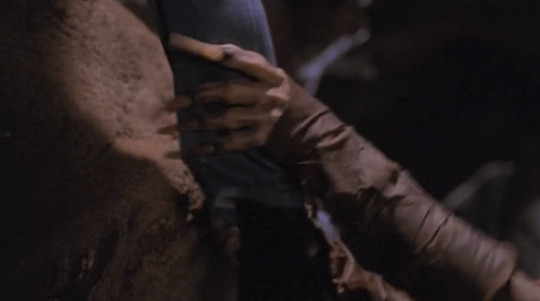

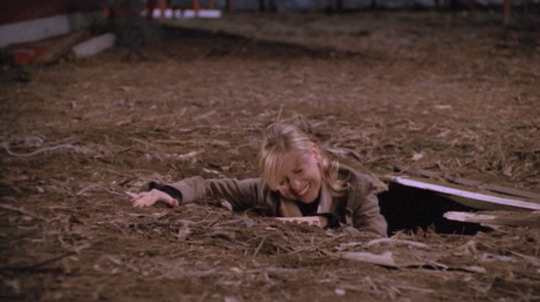



talk about season seven isolation themes. talk about how these scenes from 1x02 and 7x10 parallel each other. except in season 1, buffy has xander to help her out. and in season 7, buffy has to pull herself out. with giles only arriving to watch.
36 notes
·
View notes
Note
hey, everything okay? It's been quite a while
not really, ha. but thank you for asking!
#been very busy and very mentally ill unfortunately#i'm sorry as always for not answering asks#i really wish i could
8 notes
·
View notes
Note
Hey, how have you been? Haven't heard from you in a while
Aw, appreciate you asking! Honestly, I was going through a rough depressive episode for a while, and only recently have things been on the upswing. I'm mad that it interfered with my video project, which I was so hyped about. But I'm hoping that now that things are returning to a more even keel, I can get back to it.
#asks#as always so sorry i've let people's asks collect dust in the interim#i always love that people ask such thoughtful things and wish i had more bandwidth for replies
17 notes
·
View notes
Note
i saw on one of your old posts that you said the only thing that whedon's made (other that buffy) that you have strong feelings about is serenity. can i ask why you love serenity so much? i'm curious because i've always preferred firefly personally
Oh that's an interesting question! It's hard to say, exactly. Honestly, there isn't really a rational reason for the preference I can back things up with. If pressed, I don’t really think one is better than the other--they’re good in different ways. Part of it might be nostalgia. I saw Serenity first, in theaters, because I was obsessed with Buffy at the time (the more things change), and didn't watch Firefly until much later. It was 2005, and I was young, so it didn't occur to me to pirate the show then. And it wasn't available to rent where I was. So I'd already sort of imprinted on Serenity before I got to watch Firefly.
But beyond that, if I had to try to put it into words...I think it might be down to a couple things. First, I really like completed stories. As is pretty obvious from this blog, art is something I enjoy a lot from a theoretical perspective, and that’s been the case even from when I was very young. And it’s just easier to respond to a work when it’s complete, both analytically and emotionally. So because Serenity represents more of a complete idea than Firefly does I think on some level it’s easier for me to interact with. When I watch Serenity I feel like I had a specific artistic experience. Not just because it’s trying to resolve some of the plot and ideas from Firefly, but because by virtue of being a discrete, two-hour theatrical release, it has to be self-contained to some degree--in terms of both story and idea. Whereas because Firefly didn’t even get to finish its first season, all of its ideas, while intriguing, are sort of left hanging. I’m just not the kind of person who likes things purely on the strength of things like character attachment, so the fact that Firefly gives me a longer runtime in that world isn’t enough for me to prefer it. Between Firefly and Dollhouse I’d actually say that I prefer Dollhouse for similar reasons. I enjoy the characters and world of Firefly much more than those of Dollhouse, and even think a lot of the execution is probably stronger, but Dollhouse got to finish more of its ideas, and so I get more out of rewatching it.
Aside from that, I just enjoy so many of Serenity’s scenes and moods and setpieces. They’re all burned into my brain in this very iconic way that not much from Firefly is (though again, possibly just because I saw it at a much more impressionable age). The “iconic” factor of things is something I respond to strongly, so the fact that so many moments from it made such a memorable impression makes me feel very fondly about it. And is the main reason it has a higher rewatch value.
Still, from an objective perspective I don’t really think one is better than the other (even if I said otherwise in my original post, ha). Firefly has the benefit that most TV has over movies, which is the ability to develop characters and themes over a long period of time. And it’s enjoyable to experience that more slow and subtle thematic development, even if it was cut off early.
7 notes
·
View notes
Note
I don’t remember if it was you, but I remember someone made a wonderful analysis about the parallels between Spike, Willow, faith and the trio.
With all of them wearing “a costume” and trying to perform a “role” and using that to cope with their feelings of inadequacy by trying to define themselves as the anti-Buffy:
If Buffy was a hero, that meant they were a villain someone in opposition to her, but all of it was just performative.
And it was also incredible ironic because Buffy wasn’t even the perfect hero they all thought she was, she like them was a flawed person with different aspects of her character defining her all at once
I found the post I was looking for!
vague idea for a meta on angelus, dark willow, the trio and faith, and how they’re all villains who have a personal antagonism towards buffy. they’re all characters that are, to one degree or another, role-playing villainy and cast buffy as the hero in their bad-guy theater.
Glad you found it! I really liked that post, thanks for reminding me of it. Here's the link for anyone interested.
15 notes
·
View notes
Photo
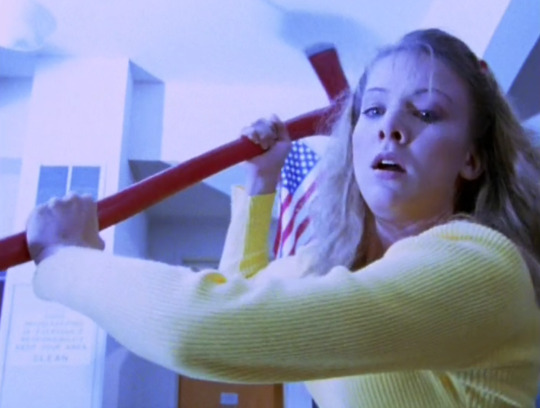
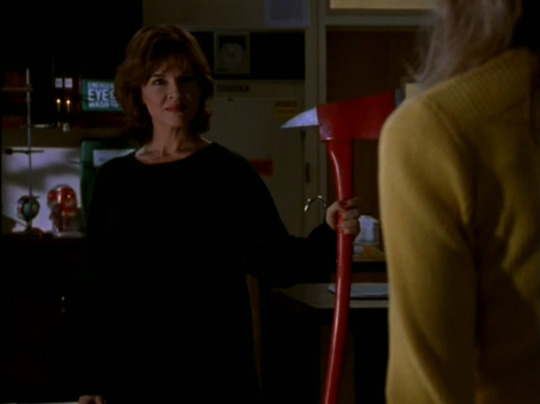
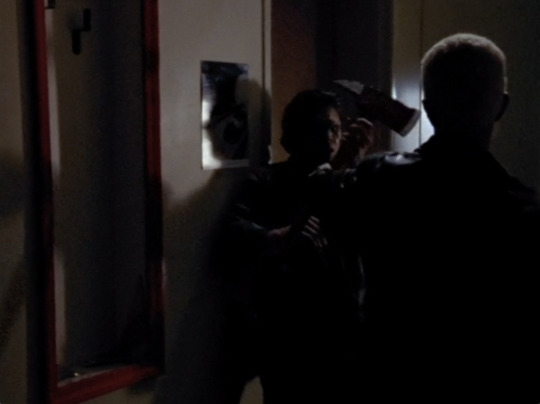
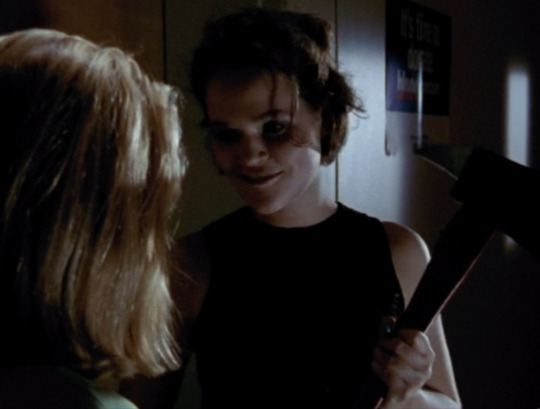
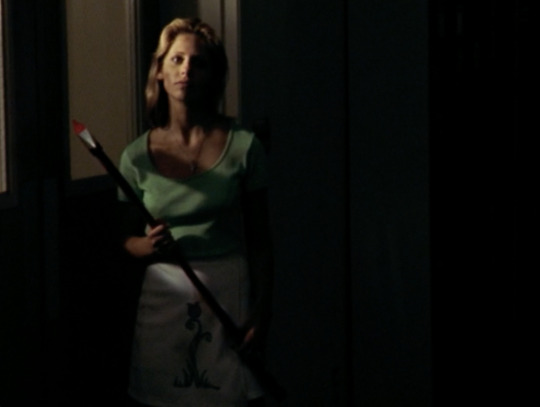
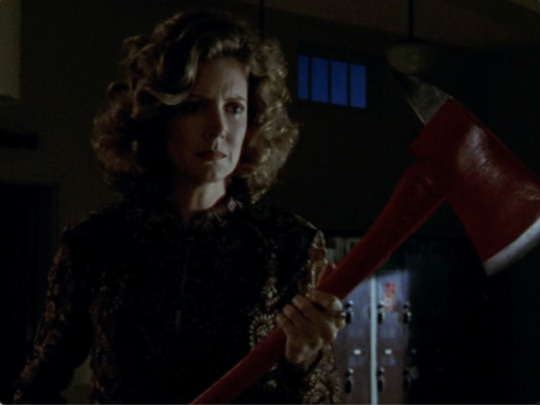
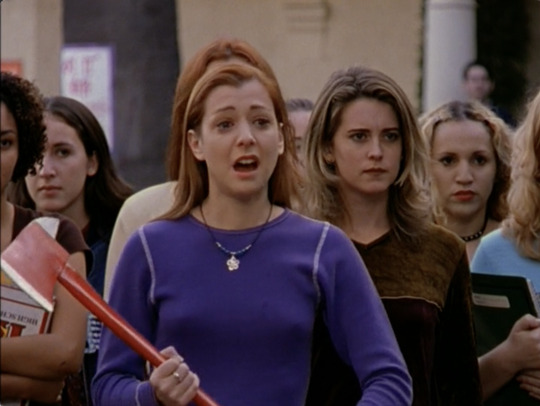
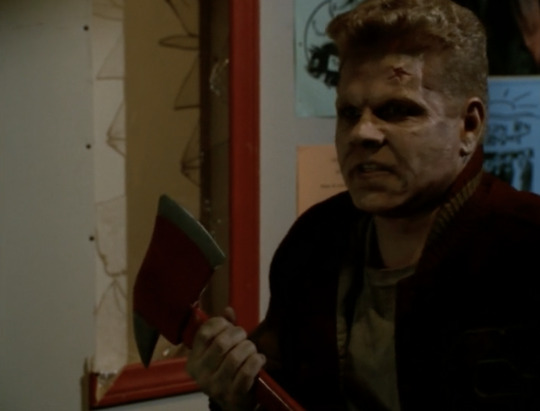
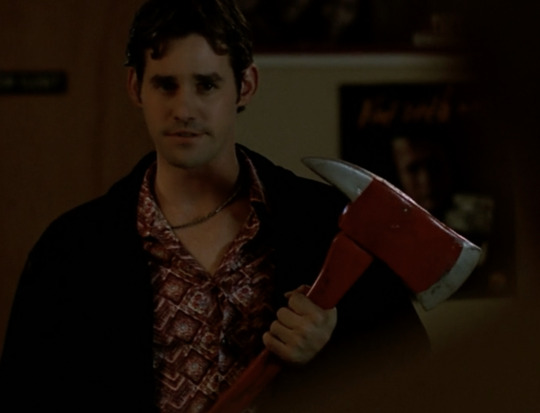

heroes and villains + the fire axe (puts a new spin on the scythe design)
375 notes
·
View notes
Note
I find it fascinating that Xander, Buffy's metaphorical heart hates both Angel and Spike, the two love interests Buffy has a deeper connection with, while he seems found of Riley, the love interest Buffy has a more superficial shallow relationship with
Yeah it's quite interesting. Though I think the specifics of what Xander's feelings about Angel, Spike and Riley means depends on context.
In the case of Riley, I'd argue that Buffy does actually think she has a deep relationship with him. As she tells him in "Out of My Mind": “Nobody has ever known me the way you do. Nobody. I've opened up to you in ways that I've never opened up to...” Certainly she's had more opportunity for emotional and physical intimacy with him than she did with Angel. Yet her conviction that they have a deep understanding is at odds with their mutual blindness to each other. Both of them are too overwhelmed by their personal crises to recognize or appreciate the other person’s wants and needs. (Buffy’s crisis may be more sympathetic than Riley’s, given the way he goes about it, but his behavior and perception of her does nonetheless take her completely by surprise.).
With this in mind, it fits that Xander is so enthusiastic about Riley, because Buffy herself is. Yet the things Xander likes about him tend to be the superficial, normatively masculine things. When Xander sees how big the Initiative is, in all its militaristic, institutional glory, that’s when he says: “Can I have sex with Riley too?” Or the way Xander calls Riley “a big jungle cat” as he does his silly military maneuvers in “Fool for Love”--and then asks "How come I’m not like that?” Or in “The Replacement” he tries to mimic Riley’s good-boyfriend behavior with Buffy, by massaging Anya--but Anya yelps with pain. Multiple times in season five, we see that Xander idolizes Riley and his relationship with Buffy, and then has that idolization disappointed. Say, Xander saying he envies Riley and Buffy’s relationship at the end of “The Replacement”, just before Riley tells him that Buffy doesn’t actually love him. Or Xander’s much-maligned speech to Buffy in “Into the Woods” that crucially leads to Buffy not catching Riley. Riley finishes the episode as blind and deaf to Buffy as ever. Xander has a romantic view of Riley, a view that Riley is who Buffy should want, which arguably matches Buffy’s own perspective. But it’s a view that ultimately leads nowhere real.
In other words, I’d say that Xander’s positivity towards Riley reflects what Buffy thinks she should want. And by contrast, I think Xander's antipathy towards Angel and Spike has to do with Buffy's fear and self-hatred towards her own emotions. (Though notably, Xander does call both Angel and Spike attractive, too. In “Teacher’s Pet” Xander says of Angel: “He’s a very attractive man, how come that never came up?” And in “Intervention” he describes Spike as “strong and mysterious and sort of compact, but well-muscled.” And “Teacher’s Pet” and “Intervention” are both early turning points in Buffy’s relationships with Angel and Spike. “Intervention” is obviously the first episode in which Buffy is shown to be capable of reciprocating Spike’s romantic interest. It might sound weird to call “Teacher’s Pet” a turning point, but similarly it is the first episode in which Angel is explicitly treated as a romantic interest and in which Buffy is clearly shown to be attracted to him, not just irritated by him. "Teacher’s Pet” is also thematically important with regards to Buffy/Angel because makes a very obvious parallel between an older teacher being interested in Xander, and Buffy being interested in an older guy. The show will even return to this female teacher/younger boy parallel with Buffy/Angel again in “I Only Have Eyes For You,” albeit with a different thematic bent.).
In season one, I’d argue that Xander is broadly treated as Buffy’s courage, and Angel is treated as her cowardice. Xander dives into helping Buffy, he “has heart”, whereas Angel keeps himself aloof. And so their antipathy is explained by Buffy’s bravery and engagement being at odds with her fear and detachment. When Xander forces Angel to help Buffy in “Prophecy Girl” you could see it as one of many symbols in the episode of Buffy conquering her fears. In seasons two and three however, Xander’s dislike of Angel seems more related to Buffy’s belief that her emotions are dangerous and destructive. Even before Angel loses his soul, there’s an ominous air surrounding the Buffy and Angel relationship, an association with death and horrible hidden faces. And afterwards this association becomes even more pronounced. Buffy spends the remainder of season two and much of season three, feeling tremendously guilty over the death and destruction that her love for Angel (seemingly) caused--including the death of Angel himself. So when Xander says things like “you wanna forget all about Ms. Calendar's murder so you can get your boyfriend back” I think he’s really the voice of Buffy’s own fears about herself. She’s afraid that to love means to romanticize, and to romanticize means to be selfish and naive. (To be like Spike, you might say).
In addition, I think the show’s ambivalent relationship to the romantic means that Xander’s negative feelings towards Angel have both a positive and a negative aspect. The positive aspect of Xander disliking Angel is the fact that some part of Buffy’s heart does see through romantic illusions. It’s annoyed and resentful of them. The negative aspect is the resulting shame that Buffy often feels about herself. Which blinds and inhibits her in a different way. But overall, I think the fact that Xander never really expresses a positive attitude towards Angel indicates the show’s overall position that while the romantic ideal that Angel represents is understandably compelling, it is still something that Buffy needs to ultimately let go.
Spike is a weirder case than both Angel and Riley though, because while Xander does express a lot of hatred towards Spike, and in specific cases with more vitriol than he ever does towards Angel, he also doesn’t just express hate. If anything, he can be downright tolerant of Spike, much like Buffy herself. While Xander and Spike regularly bicker, Spike nonetheless lives with Xander on two separate occasions (You might even make a connection between Spike living with Xander in season seven and Buffy telling Angel that Spike “is in [her] heart.”). They hang out in “Triangle.” In “Intervention” Xander expresses sympathy for how "thrashed” Spike looks. Just before Buffy kisses him. In “Him” Xander and Spike save the day together. (And there’s some symbolism for you--Buffy’s heart and her shadow teaming up to undo a spell that makes people see things in an immaturely romantic way).
It’s notable that the season in which Xander hates Spike the most is season six. Which is the season in which Buffy herself repeatedly, and violently, pushes Spike away. It is the season in which Buffy calls Spike dead, and a thing, in a mirror image of her own feelings about herself. Buffy spends the season hating herself and thinking she can’t feel, and thus it makes sense that she would be more alienated from her heart. In contrast to Xander representing bravery in season one, Xander in season six is defined by his cowardice--he is antsy about getting married, and his fears ultimately get the best of him. It is only after Buffy and Xander reconcile towards the end of season six, that Xander is able to return to his role of the heart and save the world by bravely expressing love towards towards the self-hating, shadow-consumed part of Buffy in the form of Willow. (And in parallel, Spike gets his soul and thus begins the process of becoming someone that Buffy doesn’t have to hate).
Then throughout season seven, Xander really doesn’t express much hate towards Spike. He’s very wary of him for a while, much like Buffy herself. But also lets Spike live with him, again like Buffy herself. The part of Buffy that expresses the most hostility towards Spike in season seven is Giles. Which suggests that it’s now Buffy’s reason and sense of tradition that stands in the way of her trusting herself and her emotions, rather than her heart. If anything, Xander and Anya resuming their relationship could be seen as a parallel to the developing romance between Spike and Buffy, given that Anya is also a reformed demon. (Regardless of one’s personal feelings about Spike/Buffy, they were undeniably written as a romantic pairing in season seven, and thus it makes sense to see symbolism echoing their relationship).
So in total, I think the idea is something like: Xander doesn’t like Angel because loving Angel is dangerous to Buffy. And loving Angel is dangerous because Angel is the romantic, and the romantic is something that in the early seasons, Buffy hasn’t yet developed a mature relationship to. Then Xander loves Riley because loving Riley is safe. But as it turns out, viewing someone as the safe option is its own form of romanticization and thus Riley also needs to go. Then Xander has a mixed relationship with Spike, because Buffy has an ongoing ambivalence towards herself, her emotions, and her romantic instincts.
#xander#buffy#angel#riley#spike#gen#as always this is just how i personally read the tea leaves of the show#there are arguments to be made for other interpretations#sorry this took a while to answer!#very behind on my inbox
154 notes
·
View notes
Note
Just got back on tumblr again after awhile and just wanted to say it was so cool seeing you reblog the ask regarding the Pietà, it was from my old account and I’m fangirling like crazy that you remembered it. You’re the first person I followed, I love your analysis on Buffy. You take so many thoughts I too have about the show and eloquently and concisely talk about them in a way I never could and I thank you for that cause scrolling down your blog is just an insightful and amazing time. When I watched Buffy for the first time (2019) I was high for the most of it cause I was a depressed stoner and when I got to season 6 I related so much to both Buffy and Willow. Reading your thoughts on the season (and all other seasons) made me feel less alone in my thoughts cause I was and still am a loner and never had anyone to talk to about BTVS. Anyways I’m rambling and just wanna say your fucking awesome and I’ll be looking forward to catching up on all the posts I’ve missed!
Ahh, thank you so much!! I'm sorry it took me a while to reply to this, I've been avoiding tumblr at the moment, but it means a ton to me. It makes me really happy to know that my thoughts on the show made someone else feel less alone, because feeling alone in my own thoughts on the show was one of the reasons I started the blog in the first place. (And perhaps like you, my feelings on season six were definitely ones I felt particularly alone in. It’s been nice in the last few years to see increasing numbers of people talking about loving and appreciating that season.)
Anyway, thank you again for all of the kind words. And for the Pietà ask--it was very fun to answer. Hope life’s treating you better these days (but if not, I know how that goes).
10 notes
·
View notes
Photo
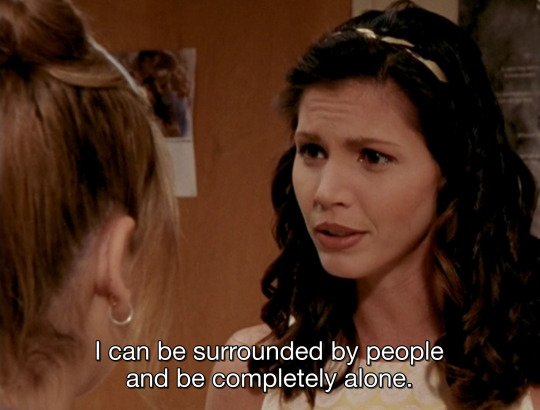



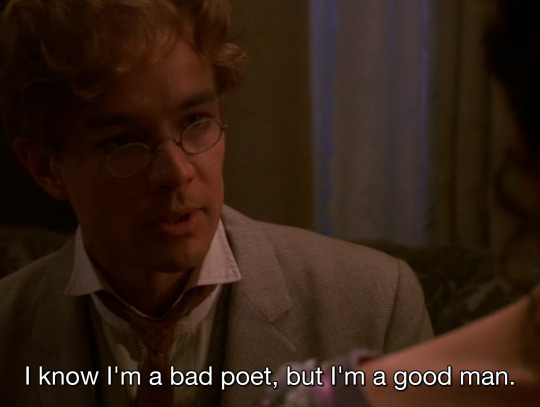

buffy’s shadow selves + feeling unseen
#s1#s4#s5#buffy#cordelia#faith#spike#get it because the shadow is unconscious#its whole problem is being unseen
674 notes
·
View notes
Note
I can’t get over the whedonian take on Michelangelo’s pieta in The Gift. How Giles is closest to her dead body, father near daughter, a sort of inverse of Mary and Christ.
oh man, you really nerd-sniped me with this one. apologies in advance for how long this is, but that ending scene from “the gift” is actually really interesting to me from an art perspective!
cut for length.
first off, for reference. here’s michelangelo’s pietà and then the shot from “the gift”:


clearly, they’re pretty similar. both feature a parental figure mourning the dead body of a foregrounded martyr. though i also think the differences highlight how the show breaks with traditional christian symbolism. like you pointed out, the genders are inverted, for one. and the visual emphasis on buffy rather than giles means that the scene is as much about buffy’s heroism as it is about parental grief. she’s much further in the foreground and her face is tilted towards the camera. whereas the pietà is very much about mary to me--mary looks almost larger than jesus, and his face is tilted away where hers is straight on. (related, there’s something to the fact that buffy is both a parent and a child in season five...so it wouldn’t make sense for her to be the centerpiece of an image that is purely about a parent mourning a child; perhaps that duality is reflected in the fact that buffy’s expression looks like mary’s). the distance between buffy and her friends also, to me, suggests that slayer isolation that dogs buffy the whole show. she isn’t wrapped in anyone’s arms. more on this in a bit.
but overall, the scene actually reminds more strongly of another, similar genre: the deposition of christ. also known as “the descent from the cross”. instead of focusing on the relationship between jesus and mary, deposition scenes feature the reactions of everyone around jesus as his body is taken off of the cross. do i think that the show was deliberately referencing this genre? no idea. it’s probably more likely that if the show was referencing anything, it was referencing the pietà, since that’s a much more famous image--and the triangular composition of both scenes echo each other. though i wouldn’t say 100% no, since the deposition is famous in its own right. if you know anything about christian art history you’ll have encountered deposition scenes (rogier van der weyden’s deposition in particular is incredibly famous and important in the context of art history. if you take any western art history class from that period, you will most likely learn about it.). and if you looked up pictures of jesus in a reference book, there’s a good chance they’d show up. but regardless of intent the similarity is nonetheless interesting to me.
to see what i mean, here’s are some examples of deposition scenes from three different countries and eras: rogier van der weyden (flemish, 1425), jusepe de ribera, (spanish, 1637), and jean beraud (french, 1892).


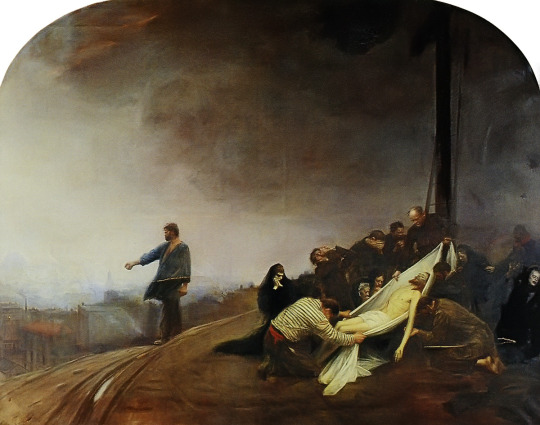
again just composition-wise, you can probably see the similarities for yourself. but content-wise, there are really interesting comparisons too. you see the figure behind christ in the first one, that’s taking him off of the cross? that’s nicodemus, who was a pharisee, ie a member of the sanhedrin, a council of jewish leaders. the story goes that the sanhedrin were responsible for arresting jesus, accusing him of various forms of heresy. they handed him over to pontius pilate, who eventually condemned him to death. nicodemus, however, was inclined to believe in jesus and secretly went to visit him at night and ask him about his teachings. you might see where i’m going with this. again, no idea what degree of intent was involved on the part of the writers, but the similarities between giles and nicodemus interest me. like nicodemus, giles is a member of a council of elders who pronounces judgement on buffy. he both goes against that council, and still to some extent belongs to it. and like nicodemus, giles has a central position behind buffy. i like the idea of the deposition being relevant here, because it means that giles has both parental and patriarchal connotations. which fits his role in the show in general.
spike is also interesting to me in light of the deposition genre, because he’s the only character who is shown broken down in tears. and usually, that’s the role of the female subjects in these scenes. i like it because of how it fits with the other ways in which the show sometimes has spike play a conventionally female narrative role relative to buffy. (if i went really crazy, i might say something about how mary’s collapsed posture in the first one echoes jesus’ posture and how spike falls from the tower just like buffy. as in, both jesus/mary and buffy/spike are shown in postures of descent, or deposition, in both works.)
lastly, this genre is interesting to me for how it often portrays jesus as a highlight in a field of mourners. you can see this in the beraud most strongly. in general, any buffy-as-jesus comparisons are difficult to get an exact hold on, given that--and as i discuss in this post--the writers tended to use their martyr imagery subversively. which makes sense, given whedon’s atheism. but the main way in which i think a buffy-jesus comparison is interesting in season five, is if you think of them as examples of having dual natures. jesus is famously both human and divine, just as buffy in season five is both human and heroic. both natural and supernatural. so the thing about jesus’s death, just like buffy’s death, is that it is a kind of triumph of both of his selves. he dies--which is about the most human thing you can do (literally an act of mortality), but he does so for the sake of humanity.
point is, if you see you see buffy and jesus both as figures of duality, then their isolated relationship to the people around them gains some layers. because on the one hand, both of them have been brought to earth, which emphasizes their human mortality. they are of the earth. but they are also apart from it. there’s also the way that they are now apart just by virtue of being dead. this apartness is particularly pronounced in “the gift”, given again, that no one is even touching buffy (just like dawn never quite touched joyce at the end of “the body”). there might be some foreshadowing of the aimlessness of season six, in that all of these characters are cut off from their purpose with buffy’s death.
there’s something also possibly to say, in terms of the buffy-jesus relationship to mortality, about how buffy actively flings herself from the tower to the mortal plane, whereas jesus passively accepts his death and is lowered to earth by others.
at any rate, these are all very much half-thoughts, and like i said i’m unsure whether the comparisons i’m making were deliberate. but at the very least they interest me from the perspective of “two different works with similar subjects converged on similar imagery.” i think in both cases, the point of showing a whole group of people is to show the wider impact of a sacrifice. if “the gift” is playing with the pietà, it might also be doing something with the idea that all of these people are buffy’s “family”, and so it’s necessary for all of them to play roles in the mourning scene, rather than a single mother. regardless, however you cut things, the blurring of the conventional symbolism--while still using the basic sacrifice imagery--definitely seems very in-character for the way that btvs uses tropes.
#tried to reblog this as a jokey easter thing#but it wasn't showing on the dash#let's see if this time works
96 notes
·
View notes
Text
in the zeppo it is demonstrated through xander that during an apocalypse buffy tends to ignore how her heart feels in favour of dealing with the immediate conflict. she repeatedly insists xander not become involved in fights because she fears he, her heart, might get hurt. when she’s arguing/angsting with angel her heart LITERALLY bursts in and demands precedence over the apocalypse, but he shrinks away when he notices the severity of the situation. she is still ignoring him, but later in the climax xander plays a big role in her survival of that night. buffy neglects dealing with her heart, but her heart is her greatest strength, and it comes through no matter how much she tries to repress it
211 notes
·
View notes